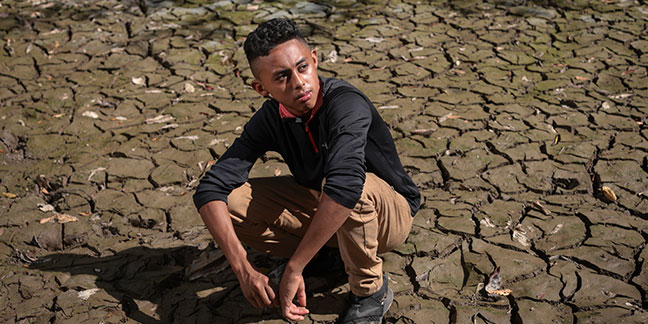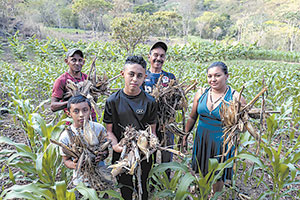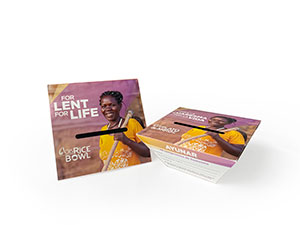 Emilson Figueroa surveys an empty fishpond that belongs to his family near Tegucigalpa, Honduras. The pond used to be filled with water year-round but now dries up during the dry season. The changing climate has had an impact on land in Honduras, but farmers are learning new techniques to water their crops, protect the natural resources and keep their families healthy. (CRS | Oscar Leiva, Silverlight)With ongoing conflicts, extreme weather events and widespread inflation making it more difficult for families around the world to put food on the table, Catholic Relief Services invites Catholics across the U.S. to pray, fast and give alms through its annual Lenten program CRS Rice Bowl, which begins on Ash Wednesday, Feb. 22.
Emilson Figueroa surveys an empty fishpond that belongs to his family near Tegucigalpa, Honduras. The pond used to be filled with water year-round but now dries up during the dry season. The changing climate has had an impact on land in Honduras, but farmers are learning new techniques to water their crops, protect the natural resources and keep their families healthy. (CRS | Oscar Leiva, Silverlight)With ongoing conflicts, extreme weather events and widespread inflation making it more difficult for families around the world to put food on the table, Catholic Relief Services invites Catholics across the U.S. to pray, fast and give alms through its annual Lenten program CRS Rice Bowl, which begins on Ash Wednesday, Feb. 22.
“The past year has been hard on so many families around the world,” said Beth Martin, CRS’ director of formation and mobilization. “We’ve seen an increase in global hunger because of a kind of perfect storm of multiple factors. CRS Rice Bowl is a great way for U.S. Catholics to show our sisters and brothers in these difficult situations that they are not forgotten, and that we will continue to stand in solidarity with them.”
The Parable of the Good Samaritan tells us to love our neighbor as ourselves, but we often forget the last words he says to the innkeeper, “Take care of him. If you spend more than what I have given you, I shall repay you on my way back.” He gives freely and wholeheartedly in equal measure to the need of the one whom he serves.
“As Catholics, we are called to serve those in need,” Martin said. “We are called to be the Good Samaritan and give freely. Almsgiving through CRS Rice Bowl is a way for us to heed God’s call and help those overseas and in our home community at the same time.”
Catholic Relief Services is the official international humanitarian agency of the Catholic community in the United States. The agency alleviates suffering and provides assistance to people in need in more than 100 countries, without regard to race, religion or nationality. CRS’ relief and development work includes emergency response, HIV, health, agriculture, education, microfinance and peacebuilding.
While CRS Rice Bowl donations go primarily to CRS programs around the world dedicated to ending hunger and poverty, 25 percent of the funds stay in the diocese where they are collected. As families in the U.S. struggle with increases in the cost of living, supporting these same efforts here at home remains of vital importance.
“By making a small sacrifice during Lent, Catholics and others of goodwill can be part of a larger movement to combat hunger not just globally, but here in the U.S. as well,” Martin said. “CRS Rice Bowl can unite us, and when we come together to combat a problem, we can achieve far-reaching, ambitious goals like bringing global hunger to an end.”
How to give
 ONLINE: www.crsricebowl.org/give
ONLINE: www.crsricebowl.org/give
PHONE: 877-435-7277 (8 a.m.-11 p.m. EST)
MAIL: Catholic Relief Services
Attn: CRS Rice Bowl, P.O. Box 5200, Harlan, IA 51593-0700
(Please write “CRS Rice Bowl” on the memo line of your check.)
Learn more
Online at www.crsricebowl.org:
- Three “Stories of Hope” videos take you to Honduras, Kenya and the Philippines, where you’ll learn how people are overcoming the causes of hunger and adapting to climate change.
- In weekly Lenten reflections and Stations of the Cross “digital retreats,” journey with Jesus to Calvary and remember our brothers and sisters around the world who experience suffering and poverty each day.
 The Figueroa family on their farm near Tegucigalpa, Honduras: (from left) grandfather Maximiliano Turcios, brothers Maynor and Emilson Figueroa, Rony Figueroa and his wife, Reina. Using new watering techniques for their crops, the family is combatting severe droughts caused by climate change.This Lent, encounter families in Honduras, the Philippines and Kenya who are overcoming hunger and the impacts of climate change with the prayers and support of people like you:
The Figueroa family on their farm near Tegucigalpa, Honduras: (from left) grandfather Maximiliano Turcios, brothers Maynor and Emilson Figueroa, Rony Figueroa and his wife, Reina. Using new watering techniques for their crops, the family is combatting severe droughts caused by climate change.This Lent, encounter families in Honduras, the Philippines and Kenya who are overcoming hunger and the impacts of climate change with the prayers and support of people like you:
Rony Figueroa grows corn, beans and bananas, but it’s hard to get good harvests working in the Dry Corridor – an area impacted by high temperatures and lack of rain. Droughts have become more frequent and storms stronger.
“Nowadays, we don’t know when winter starts or when it ends,” he explains.
A Catholic Relief Services project helped him repair an old reservoir and install a low-cost irrigation system that uses very little water. Now Rony can harvest his crops even if it doesn’t rain. His produce and income are now enough to feed his family, and he has become an advocate for caring for the environment.
Raul and Rhodora Enecillo live in Northern Samar, Philippines, with granddaughters Loraine and Kate. They rise at 5 a.m. each day to tend their farm before getting their granddaughters off to school. Education is important to them, and they hope Loraine and Kate will go to college. For years, the couple worked hard as coconut farmers, but heavy rains caused damaging floods. Then, through a CRS-funded program, Raul and Rhodora built a fishpond.
“Life is so much easier now that we have the fish for our daily living,” Rhodora says.
They have since added two more fishponds, and thanks to the extra income, Loraine and Kate are pursuing their education.
Turkana is hot and dry, with temperatures in the mid-90s year-round. Most people raise livestock such as goats and camels, but the climate makes this work difficult. Rebecca and her husband Lotiang farm and raise goats, relying on rain and river water to irrigate their crops and feed their animals. But it is raining less and less, and when it does rain, it can be unpredictable and intense, leading to floods that wash away the seeds. Through a CRS program, they installed a well and solar-powered pump and learned new farming techniques.
Lotiang also learned to grow kale, which can be sold for a high price at the market. The couple have become leaders in their community and now teach others what they learned.
Enjoy these meatless recipes from each community:
 Bean Soup with Chayote Squash & Rice
Bean Soup with Chayote Squash & Rice
1 onion, diced
1 red bell pepper, diced
2 garlic cloves, minced
2 T. olive oil
3 15-oz. cans red beans, drained and rinsed
2 C. water
1 vegetable bouillon cube
1 yellow chili, seeded and minced
1 jalapeño, seeded and minced
1 15-oz. can diced tomatoes with liquid
Juice of 1 lime
2 chayote squashes, peeled, seeded and cut into cubes, or summer squashes
Fresh cilantro
4 C. cooked white rice
Sauté onion, bell pepper and garlic in oil until translucent. Add beans, water and bouillon, and heat thoroughly. Add yellow chili, jalapeño, tomatoes, lime juice and chayote, and simmer on low for about an hour. Add cilantro and serve over rice. Servings: 4-6
Ginataang Gulay
1 T. olive oil
3 cloves garlic, minced
1 small onion, chopped
2-3 C. butternut squash, peeled and cut into 1-inch cubes
2 14-oz. cans full fat coconut milk
1 C. green beans, cut into 2-inch pieces
1-3 Thai chili peppers or serrano chili peppers, sliced
Salt to taste
4 C. steamed white rice
In a large pot over medium-high heat, heat the olive oil. Sauté the garlic until fragrant. Add the onion and continue to sauté until soft and translucent. Add the squash and pour in the coconut milk. Bring to a boil, then reduce the heat and simmer uncovered for about 5 minutes, or until the squash is soft. Stir in the green beans. Then add the sliced chili peppers and salt to taste. Simmer for 5 minutes or until the green beans are tender. Serve over steamed white rice. Servings: 4
Mukimo
4 large potatoes, chopped
1 small onion, diced
1-2 cloves crushed garlic
1/2 tsp. salt
3 C. spinach or other leafy green, chopped
1 16-oz. bag frozen corn
1 16-oz. bag frozen peas
2 T. olive oil
Place potatoes, onions, garlic and salt in a pot with water to cover the tops of the potatoes. Bring to a boil, then reduce to medium-high heat and simmer until potatoes are tender (about 20 minutes). Add spinach, corn and peas, and cook until water has completely evaporated (about 5 minutes). Add olive oil, salt and pepper to taste, and sauté until spinach is tender. Remove from heat and mash entire mixture until it resembles mashed potatoes. Servings: 4



 Bean Soup with Chayote Squash & Rice
Bean Soup with Chayote Squash & Rice